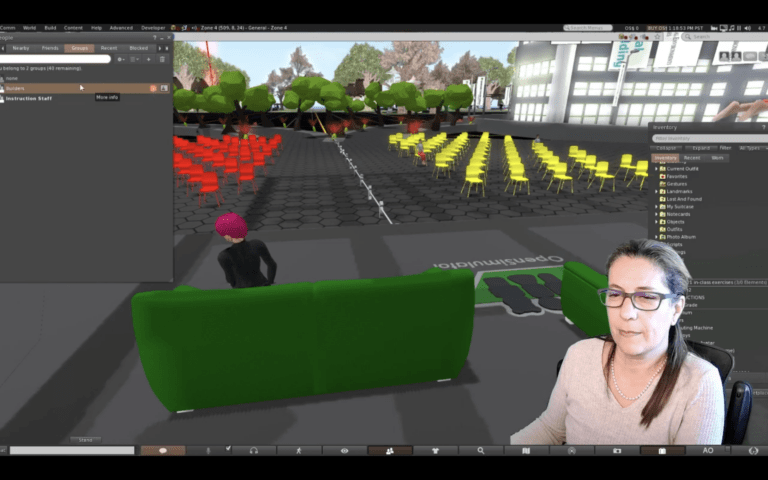UCI News: “Beyond Zoom: Virtual reality classrooms”
Cristina Lopes, UCI Chancellor’s Professor of informatics, sits in a courtyard waiting as her students slowly trickle into class. In front of them is a series of large objects: the topic of today’s lecture. Lopes reaches out and touches a yellow cylinder floating in front of her, and the object is instantly replaced with a complex line of code.
This classroom is not outside in the courtyard or a park. It’s not even on campus. Lopes’ classroom exists entirely in cyberspace, created via a program she helped design called OpenSimulator.

“I was so tired of Zoom,” she says. “This allowed me to simulate stuff that was practically impossible to do in the real world. It’s a hands-on experience that students would not be able to get otherwise.”
Students taking ICS 10: How Computers Work this past quarter were the first to be taught in this open-source virtual world. The general education class introduces programming fundamentals, provides a breakdown of how networks such as the internet function, and explores how data and information are represented in computing. While the course is included in the information & computer sciences catalogue, it’s not tailored to ICS majors.
“There was a bit of worry about the class in the beginning,” Lopes says. “Many of the students only use their phones or netbooks, so to them this software was complicated and advanced. But they’ve really done well so far.”
Lectures were conducted in the virtual world, with live demonstrations and exercises that students could participate in. After class, they were uploaded to Twitch and YouTube and made available to the public. Truly groundbreaking was the unique virtual space that each student logged into to complete the homework. Using OpenSimulator, Lopes was able to create personalized projects for the students to complete, mainly virtual representations of how low-level programming and local area networks function.
“It was really cool. You could visualize everything happening inside the computer when they punched in commands,” she says. “And when they would send messages to each other, you could see the messages like little pink spheres traveling along the network.”
Lopes is no stranger to virtual worlds. With a master’s degree in computer engineering from Portugal’s Instituto Superior Tecnico and a Ph.D. in computer science from Boston’s Northeastern University, she has been studying computer-simulated environments for nearly 20 years. Prior to joining academia, Lopes worked at the tech incubator Xerox PARC. She was a founding member of the team that developed aspect-oriented programming, which allows additional behavior to be added to code without modifying the entire program. Soon her focus turned to the creation of virtual worlds.
She is one of the main developers of the OpenSimulator program. OpenSim, as it’s commonly called, is an open-source, multi-user 3D application for the creation of virtual spaces that can be accessed by people across the globe. Clients design a “home world” that’s connected to other simulated environments, producing a virtual multiverse unique to each user.
Lopes says she overcame considerable challenges this past quarter, spending more time developing the software and coding specific assignments than she had for any other class. She plans to teach the course again next winter. And even though classes then will be in person, Lopes intends to use the OpenSimulator program again, this time via computer labs on campus.
Article originally posted at UCI News.